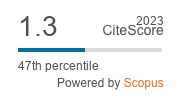Employers Expectations Vis-à-vis Graduates Of Faculties Of Economics. Results Of A Direct Study
DOI:
https://doi.org/10.1515/cer-2016-0015Keywords:
higher education, employers, graduates, economics and environmental protectionAbstract
This paper presents employers’ opinions concerning competencies they expect of graduates of Faculties of Economics with elements of environmental protection. In order to provide empirical input, we conducted a questionnaire-based study among 200 top managers of (mostly) businesses located in the Lodz region (voivodeship), including 194 enterprises and 6 entities do not involved in business but whose activities are, directly or indirectly, linked with environmental protection. The findings of our study demonstrate that while both soft and professional competencies acquired in the course of university studies are important to employers, the respondents valued soft competencies more. They found foreign languages to be the most important, although surprisingly they also attached high importance to a good command of Polish. When assessing university curricula, employers indicated that general courses, the foundations of a university education, remain important as a basis to improve the professional skills of university graduates and to reinforce their position in the labour market.
Downloads
References
Barwińska-Małajowicz A. (2012), Analiza porównawcza oczekiwań pracodawców wobec absolwentów szkół wyższych w Polsce i w Niemczech, Studia Ekonomiczne, Uniwersytet Ekonomiczny w Katowicach, Katowice, http://www.ue.katowice.pl/uploads/media/4_A.Baranska-Malajowicz_Analiza_Porownawcza....pdf.
Google Scholar
Cieślik A., Michałek J., Michałek A. (2013), Determinanty działalności eksportowej polskich przedsiębiorstw, ‘Gospodarka Narodowa’ No 7-8.
Google Scholar
EFIGE (2011), The global operations of European firms: the second EFIGE policy report, Bruegel, Brussels, http://bruegel.org/2011/07/the-global-operations-of-european-firms-the-second-efige-policy-report/.
Google Scholar
European Commission Education and Training 2020 Work programme (2012), Thematic Working Group 'Assessment of Key Competences' Literature review, Glossary and examples, http://ec.europa.eu/education/policy/school/competences_pl.htm (downloaded on 12.09.2015).
Google Scholar
Kompetencje i kwalifikacje poszukiwane przez pracodawców wśród absolwentów szkół wyższych wchodzących na rynek pracy (2012), Wyniki badania przeprowadzonego przez Szkołę Główną Handlową w Warszawie, Amerykańską Izbę Handlu w Polsce oraz Ernst & Young, Warszawa, http://firma.sgh.waw.pl/pl/Documents/RKPK_raport_2012.pdf.
Google Scholar
Ministerstwo Nauki i Szkolnictwa Wyższego, Krajowe Ramy Kwalifikacji uczenia się przez całe życie, http://www.nauka.gov.pl/krajowe-ramy-kwalifikacji-szkolnictwo/ (downloaded on 12.09.2015).
Google Scholar
Sobczyk M. (2000), Statystyka. Podstawy teoretyczne, przykłady, zadania, UMCS, Lublin.
Google Scholar
van Weerden L., Vonk F. (2014), Readiness for the international business practice: which competences students should learn to prepare for their first international job?, Paper presented at the 40th Annual Conference of the European International Business Academy (EIBA) Uppsala University, 11–13th December 2014.
Google Scholar
Downloads
Published
How to Cite
Issue
Section
License

This work is licensed under a Creative Commons Attribution-NonCommercial-NoDerivatives 4.0 International License.











